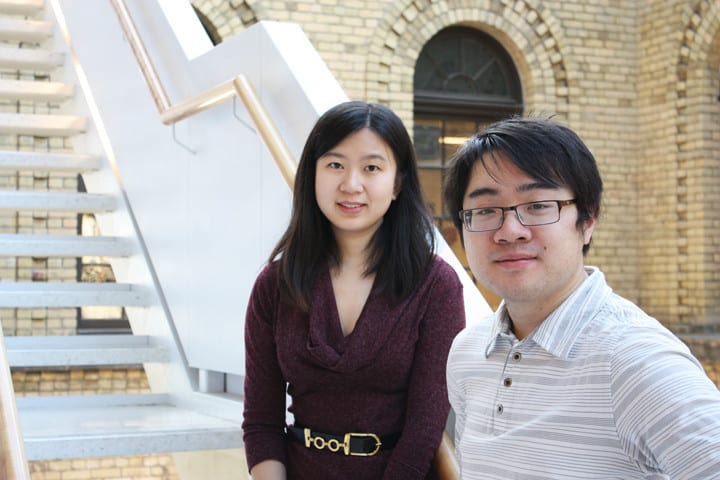On Saturday, January 12, Jasmine Song woke up to the day she had been planning for almost a year. The LMP Conference on Cancer Research, was founded and organized by Song and Desmond She, both fourth year Laboratory Medicine and Pathobiology students, with the support of the LMP students union and Dr. Doug Templeton. It was the first undergraduate conference of its kind in the country, and it addressed the future of cancer research, clinical practice, and non-profit support in Canada.
Laboratory Medicine and Pathobiology stands at the nexus of basic biomedical, scientific research and clinical practice. The exchanges between the lab and the clinic provide the opportunity to translate new knowledge into improved health outcomes for patients and populations.
The conference’s keynote speaker addressed a new term in cancer research: ‘oncodynamics.’ Dr. Gurmit Singh, a professor of Pathology and Molecular Medicine at McMaster University, and Senior Scientist at Hamilton Health Sciences, coined the term to define the impact of abnormal cues generated by tumours on the physiological functioning of the body. Singh discussed the mechanisms associated with cancer-induced pain and cancer-induced depression.
The Singh lab has demonstrated that glutamate is secreted by cancer cells via a well-defined antiporter mechanism that shuttles cysteine into the cancer cell for antioxidant synthesis, and glutamate out of the cell. They hypothesized that glutamate signaling is involved in cancer-induced pain. Furthermore, they postulated that cancer-induced depression is mediated via glutamate signaling.
The molecular mechanism implicated in this connection is the mTOR pathway, an ubiquitous protein synthesis and synaptic plasticity signaling pathway. This is real cutting edge research. Singh joked that the audience would not find anything if they googled ‘oncodynamics’ as he was in the process of defining it for the first time on Wikipedia. Singh’s research provides a ray of hope for current breast cancer patients, since the oncodynamic effects of cancer dictate quality of life for the patient.
Singh’s presentation was followed by seminars on current cancer trends. Dr. Annie Huang, an oncologist at the Hospital for Sick Children provided great insight about studies on rare paediatric cancers and how such studies have informed present understanding of tumour biology and therapeutics. Dr. Susan Done of U of T’s LMP Program discussed recent advances in the understanding of breast cancer, and different technical approaches to characterize patients’ tumours. Option three was a lecture on multiple myeloma, not to be confused with melanoma, where Dr. Chan outlined the sequence of molecular events and pathobiology involved in the development of multiple myeloma. He also talked about the application of some currently available laboratory tests on the diagnosis, prognosis and monitoring of the disease.
A networking fair at lunch provided the opportunity to meet with the renowned speakers and explore areas of involvement and volunteerism in the field of cancer. It was followed by another choice of three seminars: “Putting a Face on Ovarian Cancer: A Survivor’s Perspective”; “Subgroup-specific structural variation across 1,000 medulloblastoma genomes” by David Shih, a PhD Candidate; and “Knowledge Deficits in Childhood Cancer Survivors about Their Cancer, Treatment, and Late Effects,” by Iqra Syed an MSc candidate at U of T. Listening to the graduate students discuss their areas of study was a relatable and attention-grabbing experience for the undergraduates in the audience.
The second round of seminars was followed by a panel discussion, with the panel comprising Dr. Sylvia Asa, Medical Director of the Laboratory Medicine Program at the University Health Network, Senior Scientist at the Ontario Cancer Institute and a professor in the Department of Laboratory Medicine and Pathobiology at the University of Toronto, Sally Bean, an Ethicist & Policy Advisory at Sunnybrook Health Sciences Centre and the University of Toronto’s Joint Centre for Bioethics, and Dr. David Uehling, a member of the Medicinal Chemistry platform of the Ontario Institute for Cancer Research.
The final keynote address was delivered by Dr. David Malkin, whose talk used illustrative ‘real life’ cases to highlight the enormous advances in the diagnosis and treatment of children with cancer. Malkin discussed how an explosion of ever-newer technologies has accelerated translation of discoveries in the lab into practical diagnostic and treatment applications in the clinic. He explained that the worlds of the clinic and the lab work better in collaboration than in isolation, leading to a new approach to the practice of medicine and the conduct of science. The opportunities and challenges of this new world order were also argued.
The LMP Undergraduate Conference on Cancer Research was a coherent and complete conference, and a great opportunity for undergraduate students in the life sciences to experience and explore the different pathways that await them in the future.


